Let’s face it—missing deadlines is something we’ve all experienced.
Projects falling behind schedule can create a stressful and insecure work environment. Your team may feel overwhelmed and tired.
It can lead to mistakes, missed opportunities, and a decline in overall project quality.
But, need not worry-. With the right strategies and tips, you can deliver high-quality work, on time, every time.
This article provides valuable insights whether you’re a leader guiding a team or an individual contributor managing a heavy workload.
You will not miss a deadline again.
Why do you keep missing deadlines at work?
Missing deadlines happens a lot, even to successful people, because of how we plan and make decisions. One big reason is something called the planning fallacy, identified by Daniel Kahneman and Amos Tversky in 1979.
Basically, the planning fallacy means we tend to think tasks will take less time than they actually do. For example, you might think a project will only take ten hours over two weeks, but then unexpected problems come up, and the task turns out to be more complicated than expected.
To avoid this, it helps to break tasks into smaller parts and estimate the time for each. Also, it’s a good idea to add extra time for unexpected issues or changes in plans. This way, you can make more accurate plans and meet deadlines more easily.
Common reasons team members miss deadlines
Missed deadlines could lead to the failure of your projects. And, as a manager, you would have to face the consequences.
Here are five most common reasons why your team members are missing deadlines:
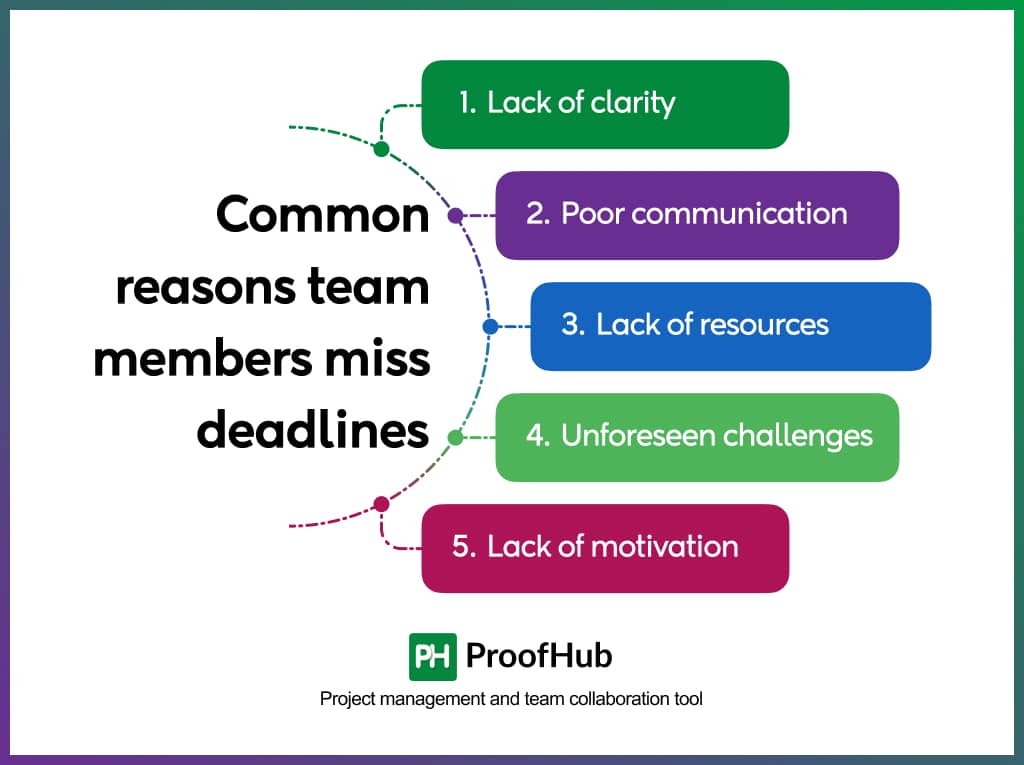
1. Lack of clarity
One of the main reasons your team members fail to meet deadlines is because they are not clear about what is expected of them.
Unclear and shifting project details like – scope, goals, deliverables, and milestones, create a frustrating environment. In that case, your team members may struggle to plan their work, prioritize their tasks, and communicate their progress effectively.
Pro tip: Establish clear and realistic deadlines and communicate with them clearly and regularly. Also, align them with the project’s overall vision and strategy.
2. Poor communication
Poor communication can lead to misunderstandings, confusion, conflicts, and project delays. When there are communication gaps, duplication of tasks happens. Unawareness of task dependencies further hinders the project’s progress.
Pro tip: Define project goals, deadlines, and individual roles for everyone to be on the same page. Establish prioritization methods and leverage project collaboration tools for centralized communication, task management, and progress tracking.
Read more: Boost collaboration and communicate effectively with your teams with 13 best internal communication tools & software
3. Lack of resources
Team members swamped with tasks or lacking necessary resources struggle to prioritize and meet deadlines.
Imagine a developer juggling multiple projects with limited coding time, or a writer facing writer’s block without access to relevant research materials. This lack of focus and resources can significantly hinder progress.
Pro tip: Ensure your team has the resources they need to succeed, whether it’s additional training, budget for necessary tools, or bringing in temporary help.
4. Unforeseen challenges
These challenges can include technical issues, changes in requirements, external factors, or personal problems. If your team members are not equipped to tackle these challenges, they may fail to meet their deadlines. Identifying risks early and having designed plans can help handle challenges smoothly and keep the project on track.
Pro tip: Maintain open communication to adapt quickly. Regular team meetings allow for course correction and ensure everyone stays aligned.
5. Lack of motivation
Your team members lack the motivation to complete their tasks. This can also be a reason to miss their deadlines.
Several factors can affect motivation, such as the value and relevance of the task, the recognition, and reward for their work, the level of autonomy and ownership of the task, or the relationship and trust between you (manager) and your team. If team members are not motivated, they may not put enough effort, care, or creativity into their work.
Pro tip: Try to understand what motivates your team members. Then, align their tasks with their interests and strengths, and always acknowledge and appreciate their work.
8 Tips to avoid missing deadlines
We recently conducted a poll on LinkedIn to find the best strategies for avoiding missed deadlines.
Guess what we found?
- 37% prefer to track their progress regularly
- 33% prefer to communicate any roadblocks in the early stages
- 21% set a buffer time for any delays
- 10% prefer to delegate their tasks effectively
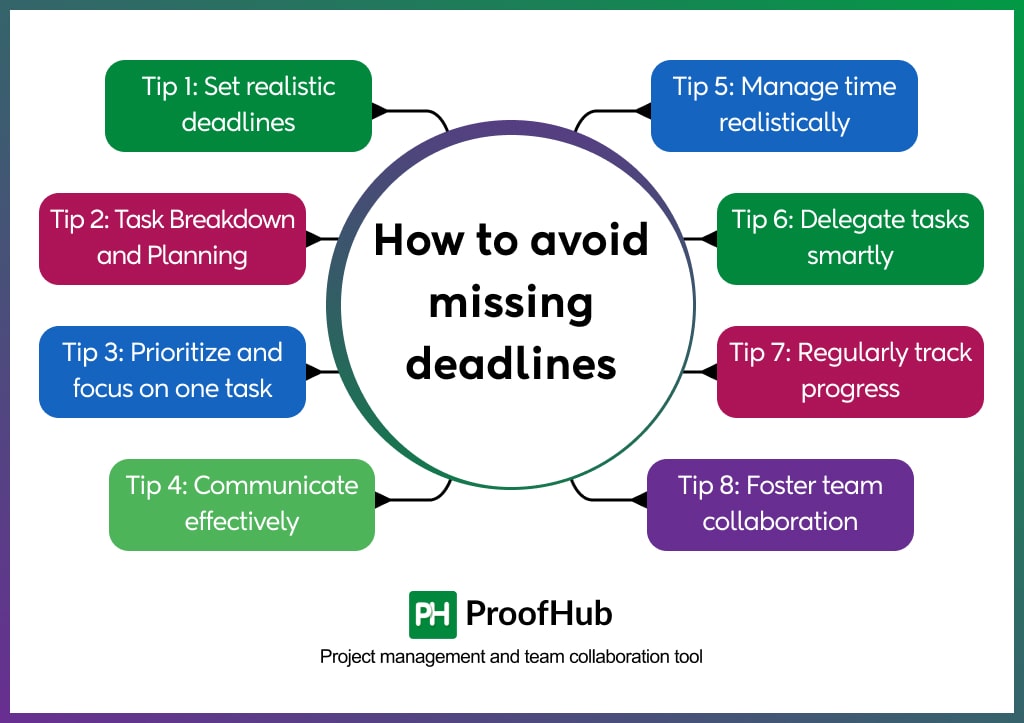
Now that we know what works, here are some tips on how you can avoid missing your deadlines.
Tip 1: Set realistic deadlines
Unrealistic deadlines can lead to many problems like poor quality of work, employee burnout, and missed deadlines.
That’s why you should set realistic deadlines for your team members. To do so, you can work together with your team and consider all the unexpected circumstances that may come up during the execution of the project.
You can also add a buffer time to your timeline. This makes sure that your team has enough time to overcome any unforeseen hurdles and still deliver the project on time.
A project planning tool like ProofHub can help you streamline your workflow. It allows you to create project plans, set accurate timelines, and assign tasks to team members. You can track the progress of the project in real-time and make necessary changes to the plan if needed.
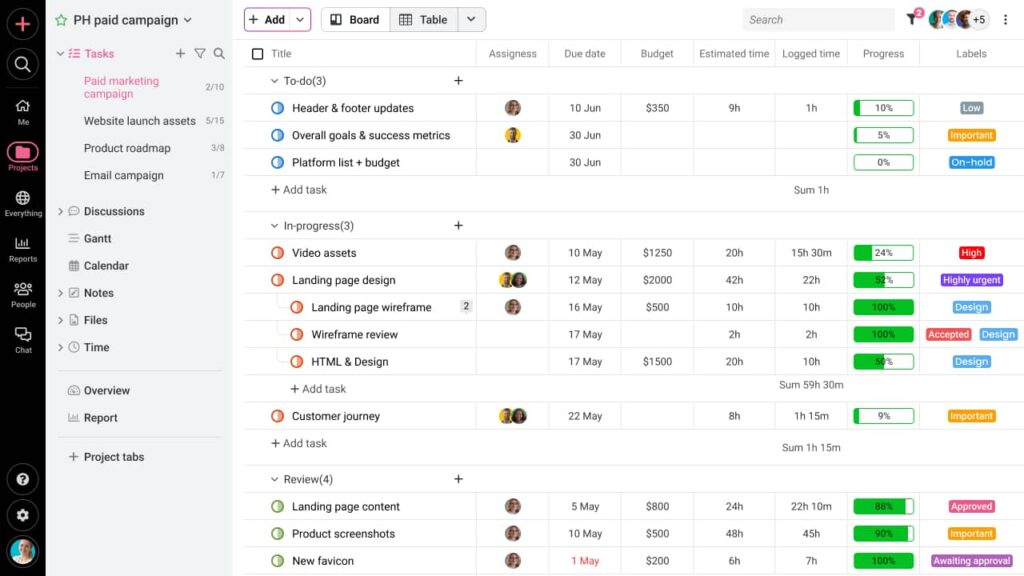
Discover how ProofHub can help you plan, organize, and manage your projects more efficiently. Check out its planning features!
Tip 2: Break down tasks and create a detailed plan
When one team member is handling a large and complex project all alone, it can be difficult for them. It can become a real burden on them and leave them feeling swamped and anxious.
To avoid this, you can break down larger projects into smaller, more manageable tasks and assign them to multiple team members. It makes the task more approachable and less daunting.
When you have a clear plan with smaller tasks, it becomes easier to focus on one thing at a time rather than trying to tackle the whole project at once. This can help you reduce stress and increase your team members’ productivity.
ProofHub’s Gantt charts allow you to visualize the project timeline and task dependencies. This makes it easier to identify potential roadblocks and adjust your plan accordingly.
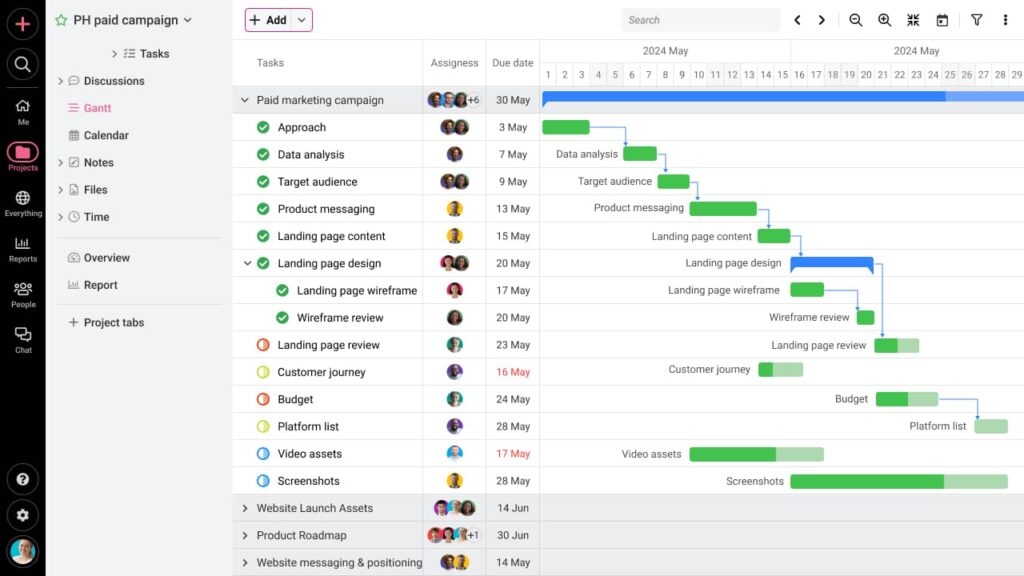
The task lists in ProofHub lets you assign tasks to your team members and set deadlines. This ensures that everyone knows what they need to do and by when. You can also track the progress of each task and make adjustments if necessary.
Tip 3: Prioritize and focus on one task at a time
According to a study, on average, productivity can increase up to 59.8% when multitasking is reduced.
You might think multitasking is the way to go, but it’s counterproductive. When you try to do multiple things at once, you end up switching between tasks, which can be distracting and time-consuming. Plus, it can decrease the quality of work and increase the chances of making mistakes.
On the other hand, when you focus on one task at a time, you can give it your undivided attention and complete it more efficiently. You can also ensure that you do your best work and deliver quality results.
With ProofHub’s task management tools, you can prioritize your tasks and stay organized. You can create tasks, assign them to individual or multiple team members, set due dates, and track their progress.
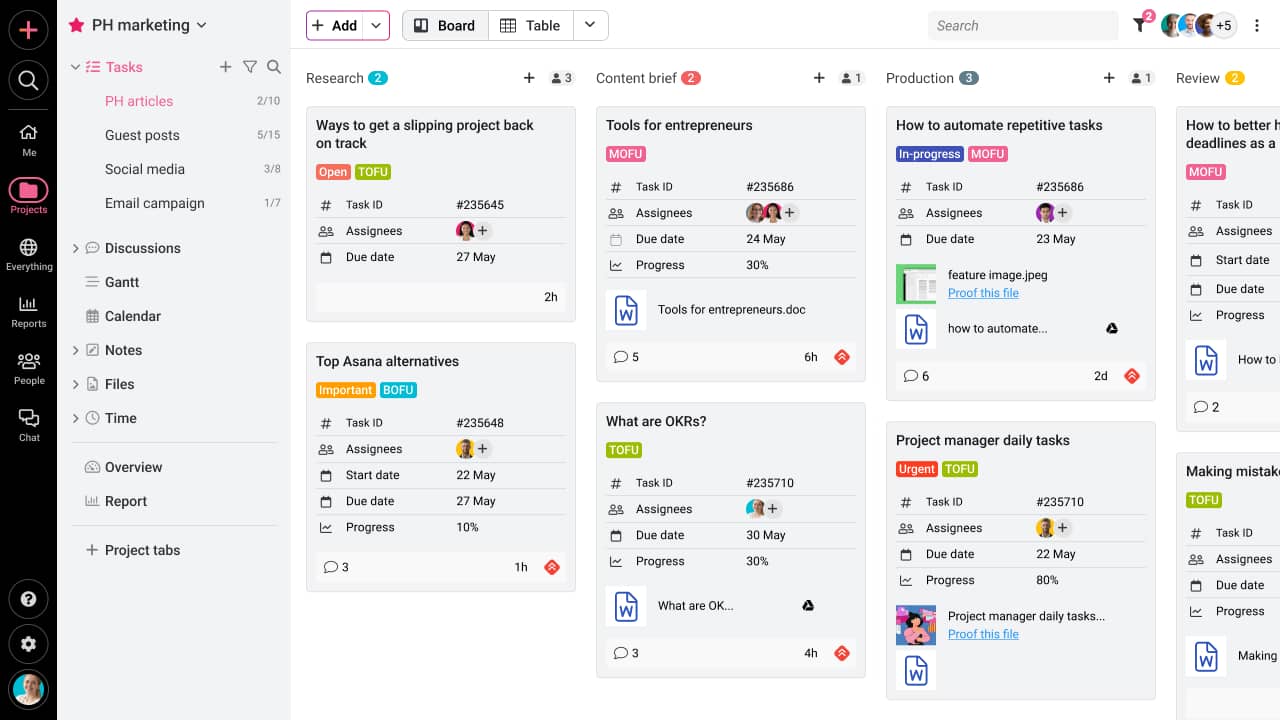
Tip 4: Communicate effectively
If you’re not communicating effectively- first, your team members may not know what’s expected of them. Second, they may not understand what their role is in the project or what the goals are. This can lead to confusion and mistakes.
Another issue is that they may not know when things are due. If you don’t let your teammates know their deadlines clearly, they can quickly lose track of time and miss important milestones. This can lead to delays and missed deadlines.
According to the 2024 State of Business Communication report, 26% say poor communication is the reason why they couldn’t finish their project on time.
ProofHub has various communication and real-time collaboration features that you can use to make sure everyone is on the same page. You can use the built-in chat, discussion, and @comments to ask questions and get clarification. You can even use announcements to ensure everyone knows about important updates or changes.
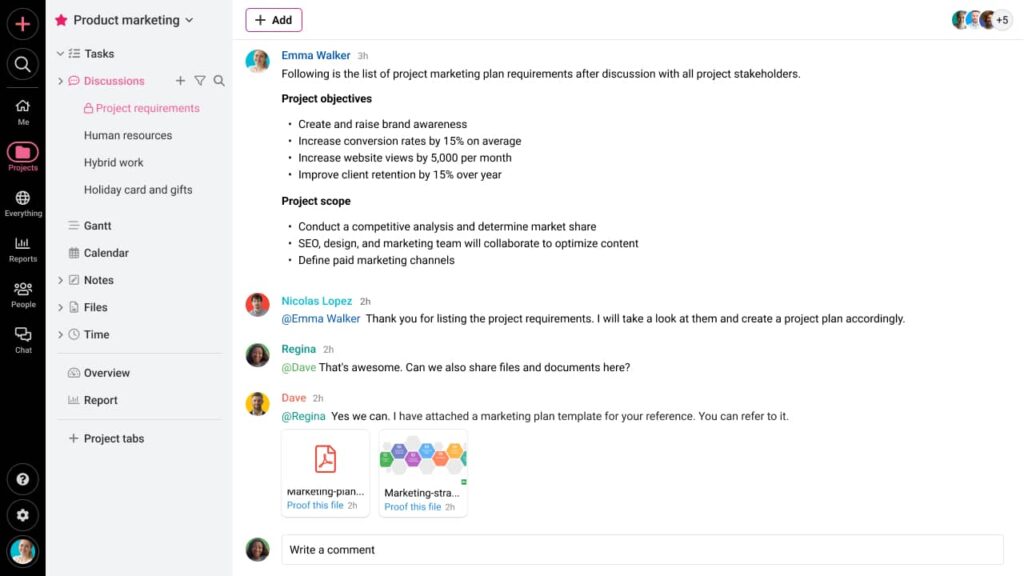
Moreover, with ProofHub’s shared calendar, you can stay on top of deadlines. You can create events and reminders for yourself and your team so everyone knows what’s due and when.
Let me share a case study on PC Itex that illustrates how the company improved its operational performance by using ProofHub as its project management tool.
With ProofHub’s features like task management, shared calendars, communication channels, and real-time collaboration tools, PC Itex could streamline its processes and achieve more efficient and effective results. They reduced the excessive time wasted in back-and-forth communication by 50%.
Moreover, 75-90% of their tasks were completed within specified deadlines, and the overall productivity increased by 4x due to centralized information provided by ProofHub.

Tip 5: Manage time realistically
If you don’t manage your time properly, you can miss important deadlines. This can result in a loss of productivity, credibility, and potential revenue.
“82% of professionals lack a structured time system.”
There are several techniques that you can use to manage your time effectively. Here are a few of them:
- With time-blocking, you can schedule specific blocks of time for different tasks. This helps you stay focused and avoid getting sidetracked.
- You can eliminate distractions by turning off your phone notifications or closing unnecessary tabs on your computer.
- The Pomodoro technique involves working for a set amount of time (usually 25 minutes) and taking short breaks in between to refresh your mind.
ProofHub’s timer and productivity-tracking tools can help you stay on top of your schedule. With its time tracking software, you can easily track how much time your team members spend on each task or project.
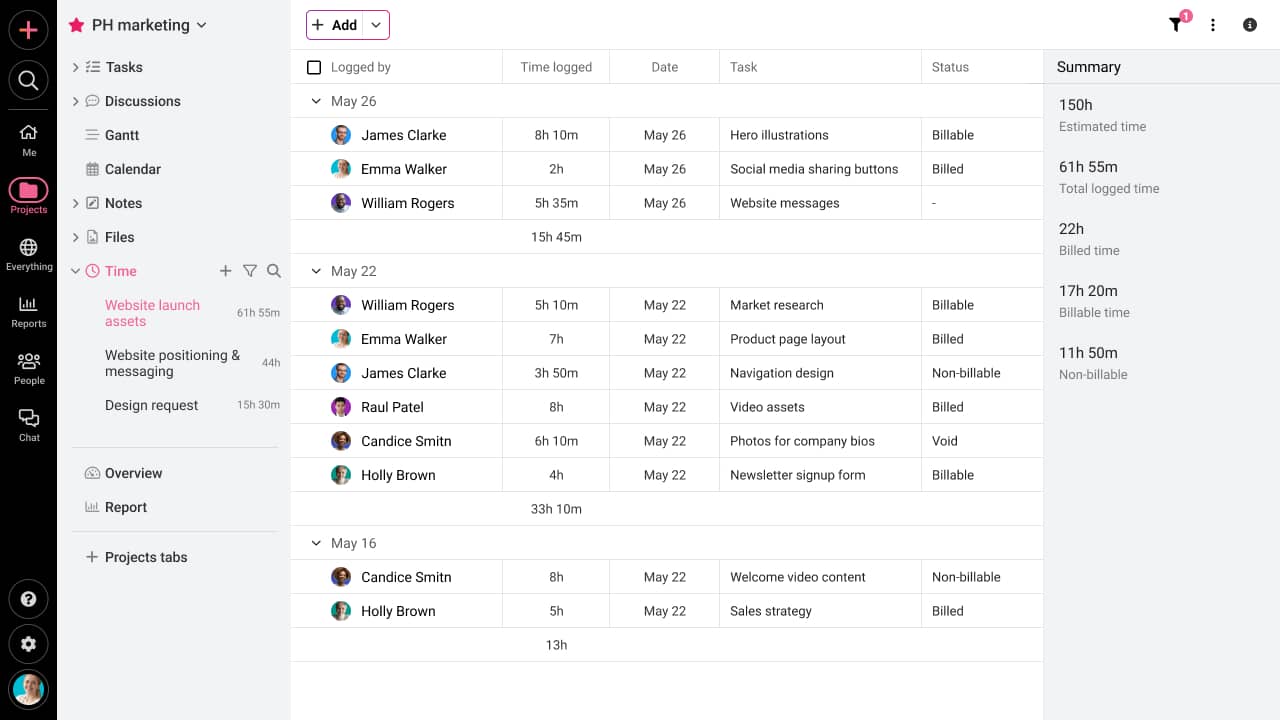
Manage your time effectively and increase productivity with 17 best online time management tools
Tip 6: Delegate tasks smartly
Delegating tasks can help you ensure that everyone on your team is working towards a common goal. But if it’s not done properly, it can lead to a host of problems, like missed deadlines, poor-quality work, and team burnout.
To avoid all these issues, you need to delegate tasks based on each team member’s strengths and workload. This way, you can ensure that everyone works on tasks that suit their skills and experience and that no one is overburdened with too much work.
ProofHub can help you delegate tasks more efficiently. With its intuitive interface and robust features, you can easily assign tasks to team members, set deadlines, and track the progress of each task in real time.
ProofHub also offers multiple views like Gantt charts, calendars, table views, and Kanban boards to visualize your work and get real-time updates on task progress.
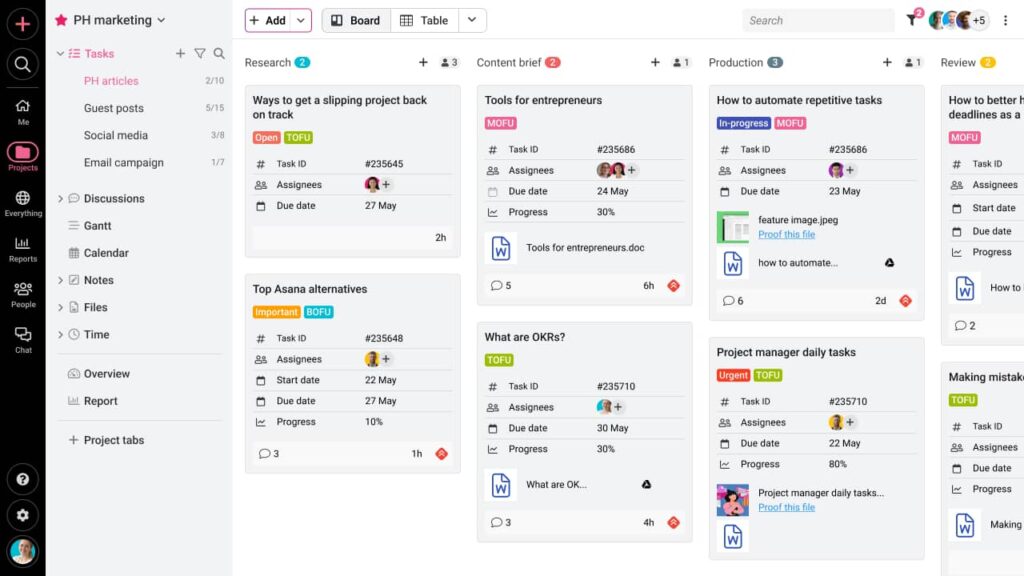
ProofHub empowers your team to stay focused, collaborate seamlessly, and deliver projects on time. Sign up for a free trial today!
Tip 7: Regularly track progress
Tracking your progress regularly helps keep tasks moving smoothly and ensures any issues are spotted early on. While staying updated on the status of each task, you can address potential roadblocks before they affect the deadlines. You can use project tracking tools to monitor progress in real time, making it easier to stay on top of timelines and make adjustments whenever necessary.
Tip 8: Foster team collaboration and accountability
Lack of collaboration in a team can lead to Off-track goals, lower productivity, and missed deadlines. Encourage your team to open communication and motivate teamwork. When working as a team, clear communication real-time collaboration, and regular feedback ensure everyone is on track and motivated. This helps team members to stay on track and meet task deadlines efficiently.
What should you do when a deadline is missed?
You are about to wrap up after a long day when you receive an email. It’s from your team manager. The message highlights a setback in your project due to a missed deadline by one of your team members.
You are now stressed about facing the consequences of this error and handling the project’s failure. Although it was not your fault, as the team manager, you are responsible for dealing with the deadlines your team has not met.
Here are five tips to deal with missed deadlines:
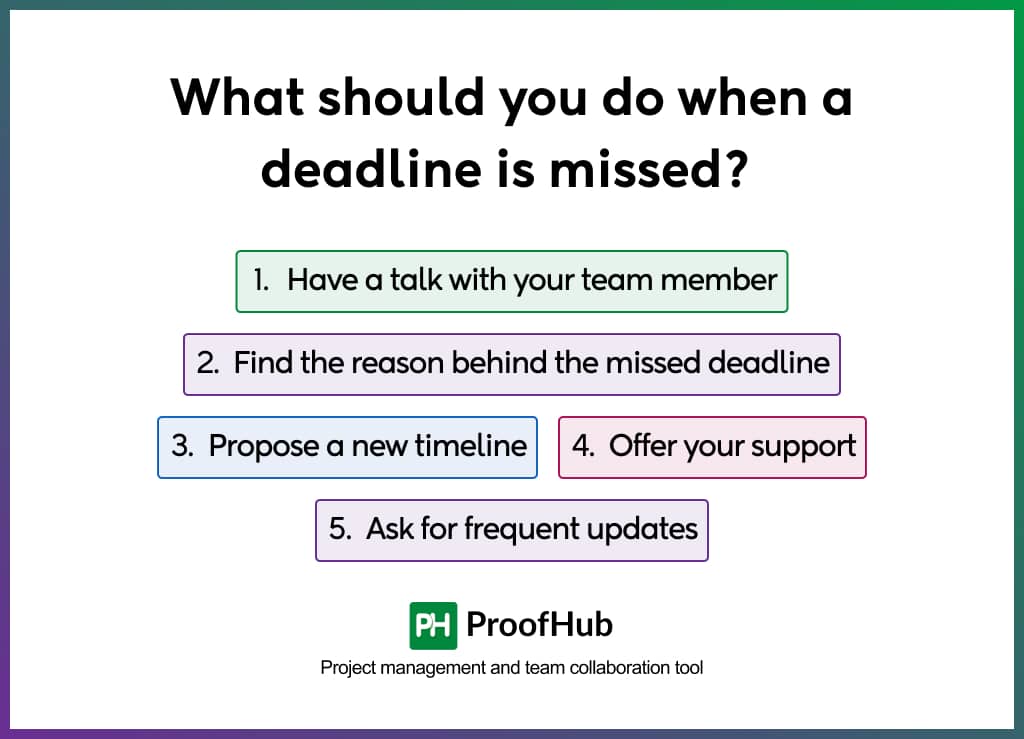
1. Have a talk with your team member
Addressing the situation plays a big role. You should have a calm and clear conversation with your team member who is responsible for the missed deadline.
Try not to micromanage or throw out general statements about meeting work targets or productivity during team meetings.
You should not lecture or scold your team members. This will not resolve the issue and might do more harm than good. Instead, you can have a constructive conversation and tell them your expectations from the team and the project.
2. Find the reason behind the missed deadline
If your team member has missed a deadline, make sure you learn why. It is important to identify the root of the problem so that you can help your team members avoid that problem in the future.
Furthermore, if your team member has taken the initiative to address their mistake, appreciate their honesty and accountability.
3. Propose a new timeline
You must start by collaborating with your team members and acknowledging the delay.
Next, work with your team to suggest an updated deadline that considers the reasons behind the delay. Also, you need to make any required modifications to the project schedule.
Make sure that the new timeline meets your project’s goals. You should emphasize to everyone how important it is to follow it.
4. Offer your support
Ask if there’s anything specific you can do to lighten their load or remove roadblocks. For example, you can delegate a subtask, provide resources, or simply offer moral support.
If workload seems to be the issue, brainstorm ways to improve their time management or workload distribution.
5. Ask for frequent updates
When your team member is working with a new deadline, you should ask for regular updates.
You can create a regular communication schedule, such as a weekly progress report. Make sure these reports address tasks completed, steps to be taken, and challenges faced by your team members.
What are the consequences of missing deadlines?
Missing deadlines triggers the butterfly effect. It starts with a small issue but quickly escalates into a bigger problem. It generally begins with:
- A hurdle that blocks your progress in moving forward
- This will give you stress and problems
- As a result, you will not be able to reach your goal
- You start to take on added responsibilities because of your setback
- If any other team depends on your task, their performance is also impacted
- By now, the overall functioning of your business has been adversely affected
Therefore, as a manager, you need to make sure that you or your team does not miss any deadlines.
Here are some of the consequences you may face if you miss a deadline:
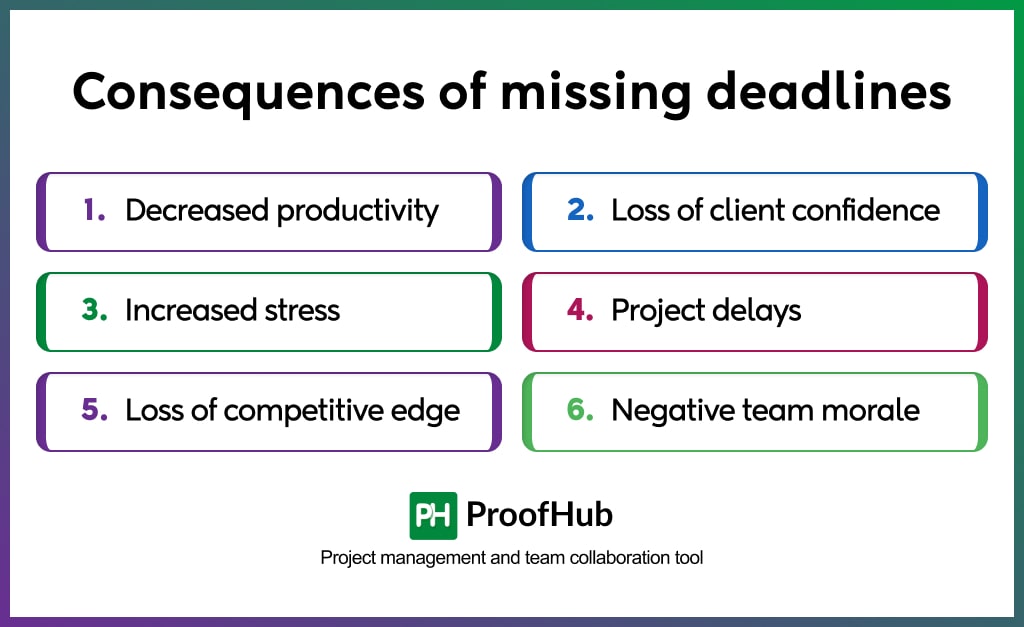
1. Decreased productivity and wasted time/resources
If you or your team members can’t complete a task by its due date, it can affect the entire project. It will delay the subsequent tasks, then their dependent tasks, and so on. This leads to a chain reaction of inefficiencies. In the end, you will waste a lot of time and resources.
2. Loss of client confidence and reputation
Clients expect projects to be completed on time. If you can’t deliver their project on time, clients see it as a sign of unprofessionalism and lack of commitment. They will lose confidence in you and your team’s ability to deliver on future projects. Ultimately, this will hurt your reputation.
3. Increased stress and burnout for the team
The pressure to catch up on missed tasks can cause your team to work longer hours and sacrifice their well-being. This will lead to burnout and reduced productivity in the long run.
4. Project delays and cost overruns
When you miss a deadline, the project is delayed. It may require additional resources to complete the project, or the client may incur penalties for failing to meet contractual obligations. This leads to increased costs, which will impact the project budget and overall profitability.
5. Loss of competitive edge
Meeting deadlines is essential to stay ahead of competitors. Timely delivery helps build trust with clients and ensures you grab new opportunities. Also, delays can lead to missed opportunities and loss of business to more efficient competitors.
6. Negative team morale
Consistently missing deadlines can lead to a drop in team morale, causing frustration, reduced motivation, and conflicts among team members.
Benefits of addressing a missed deadline
Missing a deadline can be frustrating and stressful for anyone. If you take proactive steps, you can minimize negative outcomes and gain the benefits.
Here are some benefits of addressing a missed deadline:
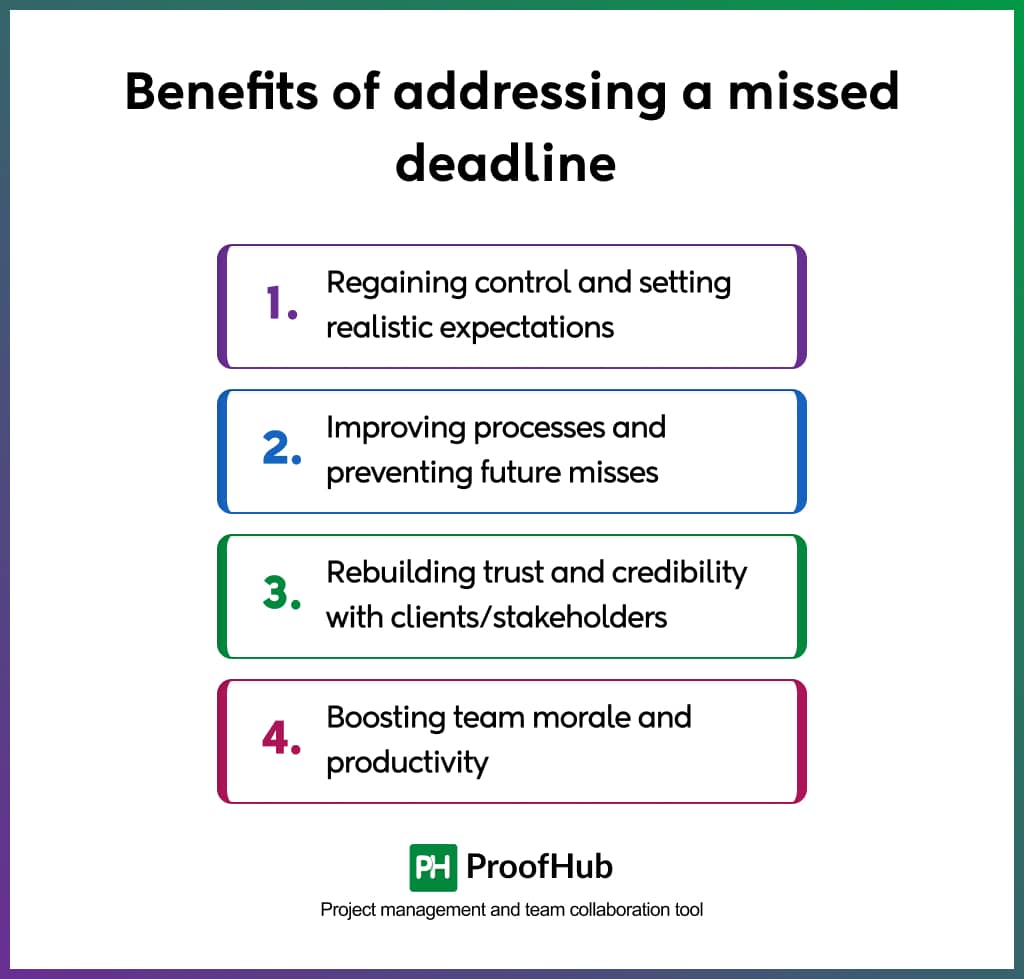
1. Regaining control and setting realistic expectations
When you or someone in your team misses a deadline, you need to figure out why it happened. By identifying the root causes of the problem, you can make necessary changes to your workflow and processes. You can regain control of the situation and set realistic expectations for your team and stakeholders.
2. Improving processes and preventing future misses
If you know the cause of a missed deadline, you can avoid similar situations in future projects. This will improve the overall efficiency and effectiveness of your team. Plus, you can avoid costly mistakes.
3. Rebuilding trust and credibility with clients/stakeholders
You need to communicate with your clients and stakeholders when you miss a deadline. By doing this, you can regain their trust and confidence. This will help you maintain positive relationships with them. Plus, you can avoid damaging your reputation.
4. Boosting team morale and productivity
If your team member misses a deadline, you need to be supportive and avoid blaming them. You need to work together to find the reasons for the delay and how you can fix it.
This will help you boost your team morale and productivity. Plus, you can create a positive work environment and achieve better results in the future.
Conclusion
Remember, even the best plans can encounter unforeseen obstacles. The key is to maintain open communication, adapt quickly, and leverage the right tools to keep your team aligned and on track.
As a manager, you are responsible for ensuring timely progress.
First, identify the reasons why the deadlines were missed. Then, take necessary actions to prevent them from happening again. With the latest technologies at your disposal, this process is simplified.
ProofHub is your one-stop solution for seamless collaboration, streamlined workflows, and centralized communication. With ProofHub, you can set clear expectations, track progress visually, and ensure everyone has the resources they need to succeed.
Sign up for a free trial today and experience the ProofHub difference!
Related articles
- 11 Strategies for meeting deadlines in the workplace
- How to be more productive at work without breaking a sweat!
- How to prioritize tasks and maximize productivity at work
- 10 Effective ways to stay organized at work
FAQs
What to do if an employee keeps missing deadlines?
You should talk with the employee who keeps missing deadlines. Ask why it’s happening, listen to their perspective, and try to find a solution together. It could involve issues with workload or time management. Or they might need additional resources.
Is it normal to miss deadlines occasionally?
Yes, missing deadlines occasionally is normal. Everyone faces unexpected situations or misjudges how long a task will take.
The point is how often it happens and why. Most likely, it would not be a major issue. But frequent missed deadlines can create problems.
How can I overcome procrastination and meet deadlines effectively?
You can start by breaking your tasks into manageable subtasks. Set achievable goals and schedule them so that you don’t miss them.
Whenever you complete a task, reward yourself for your progress. You should silence distractions while working. Track your time spent on tasks to stay focused and meet deadlines.

